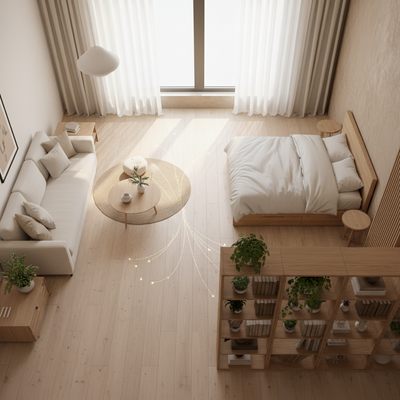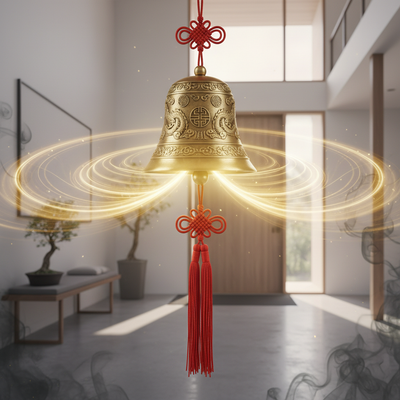You've heard the rule: never put your bed directly facing the door. If you're reading this, your bedroom setup probably worries you for this exact reason. Let us confirm that feeling right away—this is one of the most important and well-known rules in Feng Shui for good reason. This setup, often called the "coffin position," is believed to hurt your personal energy, or Qi, in a big way. It makes you feel unstable and unsafe exactly where you should feel most secure and rested. But don't worry. We've helped many people through this exact problem. This complete guide will not only explain why this layout causes problems but will also give you many practical, real-world ways to fix the energy in any type of room, from the best solution to smart fixes for the most limited spaces.
Why This Disrupts Energy

To really understand the solutions, we must first learn the main energy rule at work. This isn't about superstition; it's about how energy flow and human psychology work together to create a space that either helps or drains you. By understanding the 'why,' the 'how' of the fixes becomes much more powerful and natural. We'll explore the ideas of Qi, the famous "coffin position," and the deep psychological triggers this layout sets off.
The Rushing River Effect
In Feng Shui, Qi (pronounced "chee") is the universal life force energy that flows through everything, including our homes and bodies. Think of Qi like water. You want it to flow gently and collect in areas of rest, feeding them. A door is a main opening for Qi, a gateway through which energy enters a room. When your bed sits directly in the path of the door, it's like trying to sleep in the middle of a fast-flowing river. This direct, harsh rush of Qi is called Sha Qi, or attacking energy. It's too active, too forceful, and too disturbing for a space meant for rest, healing, and renewal. This constant energy attack can lead to restless sleep, anxiety, and a feeling of being always "on edge," stopping your body and mind from ever truly recharging.
The Coffin Position Explained
The term "coffin position" sounds scary, but it's more symbolic than literal. This specific alignment means lying in bed with your feet pointing directly out the door. The name comes from the fact that this is traditionally how dead people are positioned before being carried out of a home. From a Feng Shui view, this is very unlucky. The symbolism is one of life force and energy constantly draining away from you and out the door. It means a loss of power, a lack of control over your life's direction, and a constant outward flow of your personal Qi. While it certainly does not predict death, the name serves as a strong metaphor for the energy drain and weakness this position can cause over time. Understanding the name allows us to focus on its true meaning: it's a layout that weakens, rather than strengthens, your personal energy field.
Vulnerability Versus Security
Feng Shui rules often have deep roots in our basic psychology. On a subconscious level, sleeping in the direct line of a doorway is disturbing. It leaves you exposed and in a position where you could be surprised. Your animal instincts, which are hardwired for survival, cannot fully relax because you are in the most vulnerable possible position relative to the room's entrance. This can keep your nervous system in a low-grade state of fight-or-flight, even while you sleep. Compare this with a position where you can see the door without being directly in its path. This creates an immediate feeling of safety, awareness, and control. You are not easily surprised. You are in command of your space. This psychological security is essential for achieving deep, restorative sleep, which is the foundation of good health and a successful life.
The Commanding Position
Now that we understand the problem, let's shift our focus to the solution: the ideal feng shui bedroom bed facing door placement known as the "Commanding Position." This is the goal we aim for in any bedroom layout. It is the most powerful and lucky placement for a bed because it puts you in symbolic command of your room and, by extension, your life. It's a position that builds security, promotes restful sleep, and enhances your personal authority and control over your destiny. Achieving this position is the most direct way to harness positive, supportive energy while you rest and recharge each night.
Defining The Commanding Position
The Commanding Position is defined by a few clear, simple rules. It's less about a single "spot" and more about meeting a set of energy requirements that create a sense of safety and control. When looking at your room, check if you can meet these conditions:
- You can see the door from your bed, but you are not directly in line with it. This ensures you are aware of anyone or anything entering your space without being hit by the direct rush of Qi.
- The bed is typically placed diagonally opposite the door. This is often the furthest point from the door, providing the maximum buffer and the widest possible view.
- You have a solid wall behind your head. This provides a sense of solid support and backing in your life. A strong, solid headboard is essential as it enhances this feeling of stability and protection.
Placing your bed according to these principles immediately shifts the energy of the room from one of vulnerability to one of empowered security.
Benefits of This Position
The advantages of sleeping in the Commanding Position extend far beyond just feeling safe. By aligning yourself in this way, you are creating an environment that actively supports your well-being and success on multiple levels. The primary benefit is a big improvement in sleep quality. When your subconscious mind feels secure, your nervous system can fully disengage, allowing you to enter deeper, more restorative sleep cycles. Energetically, you are no longer losing Qi out the door; instead, you are able to receive and accumulate nourishing Qi. This leads to a more stable, resilient personal energy field, which can show up as better health, clearer thinking, and a greater sense of calm and confidence in your waking life. Being "in command" of your bedroom helps you feel more in command of your career, your relationships, and your personal journey.
Practical Cures and Fixes
What if your room's architecture, size, or window placement makes achieving the textbook Commanding Position impossible? This is a common reality, but it doesn't mean you're stuck with bad Feng Shui. We have an entire toolkit of powerful cures that can remedy a feng shui bedroom bed facing door. The key is to understand the order of these solutions. We'll start with the most effective fix and move through a series of practical, actionable adjustments that can block, deflect, or disperse the negative energy, allowing you to create a harmonious space no matter the layout.
Solution 1: Reposition the Bed
The first and most effective cure is always to move the bed. Before exploring other options, take another look at your room with the principles of the Commanding Position in mind. Could you place it diagonally opposite the door? Is there another wall you could use that keeps you out of the direct line of the doorway? Even a small shift of a few feet to the side can be enough to move you out of the direct "rushing river" of Qi. This is the foundational solution because it addresses the root cause of the problem directly. Try sketching out your room on paper and experimenting with different layouts. Sometimes a fresh perspective reveals a possibility you hadn't considered before.
Solution 2: Use Blockers
If moving the bed is not an option, the next best thing is to create a physical barrier between your feet and the door. This blocker acts as a shield, absorbing the impact of the rushing Qi and preventing it from hitting you directly. The more solid and substantial the blocker, the more effective it will be. You have several excellent, and often stylish, options:
- A Solid Footboard: The simplest solution is a bed that has a high, solid footboard. This acts as a built-in protective shield.
- An Upholstered Bench or Trunk: Placing a sturdy bench, ottoman, or storage trunk at the foot of your bed is a highly effective and functional cure. It creates a clear buffer and can also be used for seating or storage.
- A Bookshelf or Cabinet: For a very strong energetic block, a low bookshelf or a small cabinet can be placed at the foot of the bed. This substantial piece of furniture firmly grounds the energy and creates a definitive barrier.
Solution 3: Hang a Crystal
When a physical blocker isn't practical, a symbolic fix can be remarkably effective. The classic Feng Shui cure is to hang a multi-faceted crystal ball from the ceiling. It must be a faceted crystal, not a smooth one, as the facets are what do the work. The crystal should be hung approximately halfway between the foot of your bed and the door. The principle here is that as the rushing Qi (Sha Qi) flows from the door, it hits the crystal. The many facets catch this energy and disperse it, scattering it gently and harmlessly in all directions around the room. This effectively slows down and softens the energy before it can reach you, transforming the "rushing river" into a "gentle mist."
Solution 4: Use a Screen

Another excellent way to create a barrier is with a soft or partial blocker. This is a great option for smaller spaces or when you want a less imposing solution. A decorative folding screen placed strategically between the foot of the bed and the door can completely block the direct line of sight and energy. This not only solves the Feng Shui issue but can also add a beautiful design element to the room. Alternatively, a large, tall plant with lush foliage, like a Fiddle Leaf Fig or a Kentia Palm, can serve a similar purpose. It visually and energetically breaks the harsh line from the door to the bed, softening the flow of Qi.
The Room Solution Matrix
To deliver highly personalized and practical advice, we need to move beyond generic recommendations. The best cure depends entirely on your specific room layout and the exact nature of the problem. To help you diagnose your situation and choose the most effective remedy, we've developed a simple triage matrix. This tool will empower you to assess your bedroom like a practitioner and create a clear action plan.
Assess Your Bed Alignment
First, stand at your doorway and look at your bed. Then, lie in your bed and look at the door. Determine which of the following three scenarios best describes your situation. Be honest about the alignment; this clarity is the first step toward finding the perfect solution for your unique space. Are your feet pointed directly at the center of the door? Is only a corner of the bed in line with the door? Or are you completely off to the side?
The Solution Matrix Table
Once you've identified your scenario, use the table below to find the best hierarchy of solutions. These are listed in order of effectiveness. We recommend you start with the first solution and only move to the next one if the first is not feasible in your space. In many cases, layering two solutions (e.g., a physical blocker and a crystal) can provide an even more powerful remedy, especially in challenging layouts.
| Scenario | Description | Best Solution Hierarchy (Try in this order) |
|---|---|---|
| Direct Alignment | Your feet point directly at the door. The bed is in the classic "coffin position." This is the most challenging alignment. | 1. Move the Bed: Prioritize repositioning to the Commanding Position above all else. 2. Use a Substantial Blocker: If moving is impossible, use a solid footboard, a heavy bench/trunk, or a low bookshelf. 3. Hang a Faceted Crystal: Use this in addition to a blocker if you still feel unsettled, or as a primary cure if a blocker is not possible. |
| Partial Alignment | Only a part of the bed (e.g., one corner, your legs) is in line with the door as it opens. The energy is still disruptive but less direct. | 1. Use a Physical Blocker: A bench, folding screen, or a tall plant is often sufficient to deflect the energy. 2. Hang a Faceted Crystal: This is a very effective cure for partial alignments to disperse the angled Qi. 3. Minor Bed Adjustment: Try shifting the bed a few inches to one side to move it completely out of the line. |
| Diagonal View | You can see the door from bed, but you are not in its direct path. The door is off to the side. | This is generally okay and is often the Commanding Position. No cure is needed unless you feel unsettled. If so, a small plant or a rug can help to soften and ground the energy between the bed and the door. |
Real-World Feng Shui Challenges
In an ideal world, every bedroom would have the perfect layout for the Commanding Position. However, we live in the real world, where modern homes, small apartments, and quirky architectural features often present significant challenges. Acknowledging these limitations is the first step to finding creative, practical solutions. Feng Shui is not about achieving perfection; it's about doing the best you can with the space you have to create a supportive and harmonious environment.
When You Cannot Move It
Let's address the most common frustration: you absolutely, positively cannot move your bed. Perhaps it's a tiny studio apartment, or the only viable wall has a window, or built-in closets dictate the entire layout. Please be reassured, this is a very common problem. In these situations, your strategy should be to "layer" the cures we've discussed. Don't rely on just one. Instead, create a multi-pronged defense. For example, you could use a stylish upholstered bench at the foot of the bed and hang a faceted crystal from the ceiling. You might also add a rug between the bed and the door to help slow and ground the energy. By combining multiple cures, you create a robust system that collectively achieves what a single cure might not.
A Creative Case Study
Overcoming challenging layouts is a common task for Feng Shui practitioners. For instance, our team at THE QI FLOW recently consulted on a studio apartment where the only logical bed position was directly facing the door, with a large window on the only other available wall. A simple bed move was impossible. The client felt exposed and slept poorly. We implemented a layered solution: a stylish, low-profile upholstered bench at the foot of the bed to act as a buffer, combined with a strategically placed tall Fiddle Leaf Fig plant to the side, which broke the direct visual line to the door. This multi-faceted approach transformed the space, making it feel instantly more secure and restful, demonstrating how creative thinking can solve even the most restrictive Feng Shui dilemmas.
Navigating Other Obstacles
The door isn't the only feature to be mindful of. A bed's placement relative to other architectural elements is also crucial. Avoid having the head of your bed directly under a window. A window doesn't provide the solid, stable support of a wall, which can lead to feelings of insecurity and restless sleep. If this is unavoidable, ensure you have a very solid headboard and use heavy, thick curtains that you close at night to create a symbolic wall. Similarly, avoid sleeping under heavy overhead beams or sharply slanted ceilings. These features create oppressive energy (Sha Qi) that can weigh down on you as you sleep, potentially leading to headaches and a feeling of being stuck. A fabric canopy can be a beautiful and effective cure, creating a soft ceiling that diffuses the oppressive energy.
More Essential Bedroom Rules
While correcting the bed's relationship to the door is paramount, creating a true sanctuary involves a few more key principles. Once you've addressed the main issue, you can fine-tune the energy of your bedroom with these three essential Feng Shui rules. These adjustments work in concert with your bed placement to foster deep rest, stability, and positive energy in your most personal space.
Rule 1: Solid Headboard
A solid headboard is non-negotiable in Feng Shui. It represents support, stability, and strength in your life and relationships. It symbolically "has your back." Choose a headboard that is solid and securely attached to the bed frame. Avoid headboards with bars or perforations, as these represent being trapped or having weakened support. A solid wood or upholstered headboard provides the best energetic backing, anchoring your energy while you sleep and promoting a sense of security and confidence in your waking hours.
Rule 2: Clear Under-Bed Space
The space under your bed needs to be open and clear. Qi needs to flow freely all around your body as you sleep to cleanse and rejuvenate your energy field. Storing items under the bed, especially items with strong emotional attachments or chaotic energy (like old shoes, unresolved paperwork, or sentimental clutter), creates stagnant Qi. This stagnant energy can disrupt your sleep, contribute to health issues, and keep you energetically stuck in the past. If you must use the space for storage, limit it to soft, sleep-related items like clean linens, blankets, and pillows.
Rule 3: Be Mindful of Mirrors
Mirrors are powerful energy activators in Feng Shui, which is why they are generally not recommended in the bedroom. A mirror should never be placed where it reflects the bed. The active energy of the mirror can bounce too much Qi around the room, disrupting the calm, yin energy required for sleep. It is said that a mirror reflecting the bed can also invite the energy of a third party into a relationship and can even startle the soul as it re-enters the body upon waking. If you have a mirrored closet, you can hang curtains over it at night or apply a frosted film to soften the reflection.
Creating Your Sanctuary
We've journeyed through the core principles of bedroom Feng Shui, from understanding the problem of a bed facing the door—the "coffin position"—to identifying the ideal "Commanding Position." Most importantly, we've armed you with a wide array of practical, actionable solutions, from moving the bed to using blockers, crystals, and creative layering for even the most challenging spaces. Remember that Feng Shui is not about a rigid set of superstitious rules; it is the art of arranging your environment to create a flow of energy that supports and nourishes you. Your bedroom should be your ultimate sanctuary for rest, romance, and rejuvenation. By implementing even one of these changes, you are taking an empowered step toward creating a space that not only feels better but actively contributes to your health, happiness, and success.







